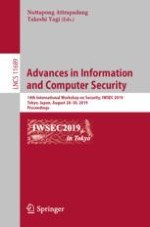2019 | OriginalPaper | Chapter
API Usability of Stateful Signature Schemes
Authors : Alexander Zeier, Alexander Wiesmaier, Andreas Heinemann
Published in: Advances in Information and Computer Security
Publisher: Springer International Publishing
Activate our intelligent search to find suitable subject content or patents.
Select sections of text to find matching patents with Artificial Intelligence. powered by
Select sections of text to find additional relevant content using AI-assisted search. powered by
